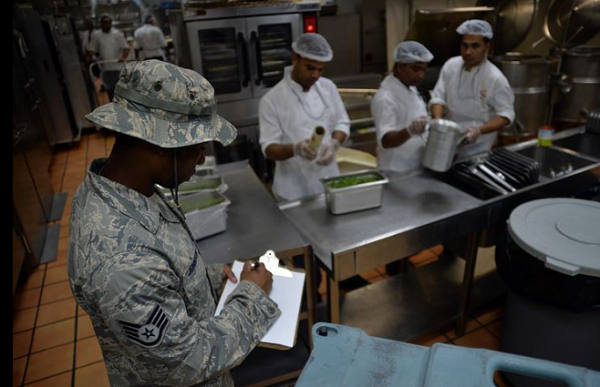Air Force Public Health (4E0X1) specialist are responsible for the health and safety of the community.
Their job is to protect airman from illness and diseases by educating individuals on safety procedures and investigating hazards.
In this position, airman will perform public health activities all over the world.
Education, Qualifications and Training
The Air Force Public Health position is a position that has basic requirements, but allows for advancement into other positions.
Education
You must have a High School Diploma, GED or GED with 15 college credits.
Having a GED versus a High School Diploma or GED with college credit increases the score you have to receive on the ASVAB test.
You must meet the minimum general testing requirements for the Air Force.
Qualifications
Air Force Public Health specialists should have knowledge of basic biological and physical sciences.
You must have normal color vision, (as with most Air Force positions).
Recruits must pass the reading aloud test (RAT).
To join the Air Force you must be at least 17 years old with parental consent, or 18 without.
You cannot be older than 39.
Because you will be operating government motor vehicles, a valid driver’s license is required.
Related Article – How To Join The US Air Force
Training
All recruits will complete 8.5 weeks of Basic Military Training.
After Basic Training, Public Health specialist will head to Wright Patterson Air Force Base in Ohio for 47 days of technical training.
What Does an Air Force Public Health specialist do?
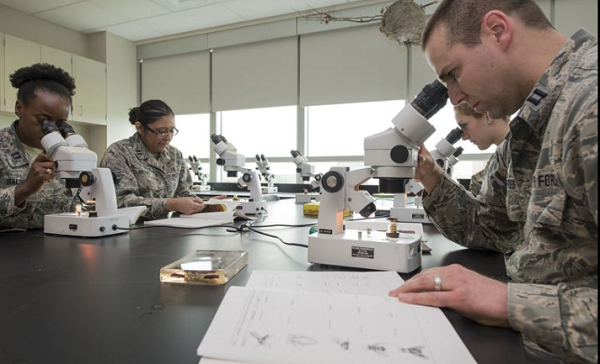
Air Force Public Health specialists oversee medical clearance for personnel who are deploying.
They also control all aspects of disease control and outbreak.
Public Health specialists will train medical staff on the proper techniques for avoiding the spreading illnesses.
They will advice healthcare providers any time there are potential hazards in their working environment.
Related Article – Air Force Health Services Management (4A0X1): Career Details
These specialist aim to prevent the spreading of diseases by conducting patient interviews, investigations and through community outreach programs.
In addition to preventing and responding to illness and disease outbreaks in medical settings, Air Force Public Health specialists conduct food and safety programs.
An Air Force Public Health specialist will asses any risks that may be associated with food preparation, production, storage and serving food.
They will train individuals on preventing food borne illnesses and respond to any complaints.
If a food illness outbreak or contamination does occur, Public Health specialist will conduct investigations and work to reduce the amount of people affected.
This position may require conducting unannounced inspections and writing citations for any violations found.
Individuals must learn FDA compliance standards and uphold all facilities to these standards.
The video below is from an Air Force Public Health specialist and explains the position’s basic job duties.
What Does an Air Force Public Health Specialist Make?
All individuals in the Air Force make the same base pay based on rank and years of service.
The table for the Air Force is below.
| Insignia | Pay Grade | Rank | Abbreviation | 2023 Minimum Monthly Pay |
|---|---|---|---|---|
| E-1 +4 months | Airman Basic | AB | $1,917.60 | |
| E-2 | Airman | Amn | $2,149.20 | |
| E-3 | Airman First Class | A1C | $2,259.90 | |
| E-4 | Senior Airman | SrA | $2,503.50 | |
| E-5 | Staff Sergeant | SSgt | $2,730.30 | |
| E-6 | Technical Sergeant | TSgt | $2,980.50 | |
| E-7 | Master Sergeant | MSgt | $3,445.80 | |
| E-8 | Senior Master Sergeant | SMSgt | $4,957.20 | |
| E-9 | Chief Master Sergeant | CMSgt | $6,055.50 | |
| E-9 | Command Chief Master Sergeant | CCM | $6,055.50 | |
| E-9 | Chief Master Sergeant Of The Air Force | CMSAF | $6,055.50 |
Benefits
In addition to the pay table above all Air Force members receive benefits.
The benefits range from housing assistance to tuition assistance.
Benefits that the Air Force provides are generally better than ones found in civilian positions.
Insurance
The Air Force provides free or low cost insurance to all recruits.
This coverage is for comprehensive medical and dental and can be used at both military or civilian facilities.
Airmen also receive paid sick time and low cost life insurance options.
Housing and Food
Living expenses are covered for individuals who choose to live in the on-base housing.
These expenses cover utilities and maintenance.
For individuals who choose to live off of the base, they will be provided with a housing allowance that is based on rank, family status and location.
Food allowances are also provided.
As a single airmen you could eat as many as 4 meals in the on-base dining facility a day for free.
To provide you with additional savings, there are tax-free department and grocery stores on base.
Related Article – CIA Special Activities Division (SAD): 12 Things You Never Knew
Retirement
As an airmen you are eligible to retire after 20 years of service.
Your retirement benefits will be available the first day you retire.
This retirement plan is available without payroll deductions.
If an individual wishes to have additional money taken from their check towards retirement they can voluntarily participate in the Thrift Savings Plan.
Vacation
The Air Force provides 30 days of paid vacation.
During their vacation, airmen may use any open space on an Air Force aircraft to travel to their destinations.
Education
The Air Force is supportive of furthering your education.
As an airman you can take advantage of the Air Force Tuition Assistance program, the Post 9/11 GI Bill or the Montgomery Bill to get tuition assistance.
With these programs you can receive up to full tuition coverage.
Recreation
Living on base provides many different recreational activities.
Most bases have swimming pools, golf courses and bowling alleys.
Every base also has social activities and youth activities.
Job Reviews
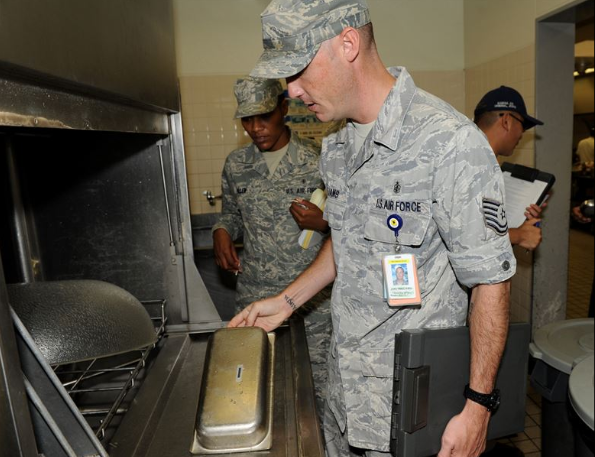
When reading reviews of Air Force Public Health positions, people are satisfied with their job choice.
Positive aspects that previous or current Public Health specialist provide include being able to help people, camaraderie, health care and other benefits, and the ability to travel.
Most of the reasoning for people not to recommend Public Health positions are related to general Air Force aspects, not the specific Public Health position.
Negative aspects that people mention include being away from family during training or deployment, the amount of times you may have to move and promotions being sometimes hard to achieve.
A few job reviews from previous employees are below.
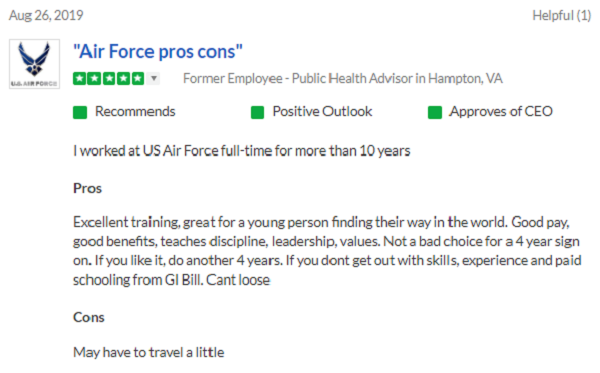
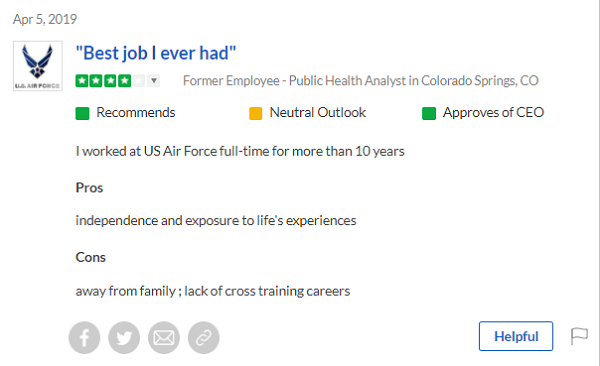
Civilian Job Opportunities
The discipline that you learn in the Air Force and the skills that you learn specifically training for Public Health will directly relate to a few different civilian jobs.
The most relate-able civilian job is working for the Health Department as a Food and Health Inspector.
This position has similar tasks including monitoring food service locations for safety violations and providing preventative training,
Other civilian options include:
- Community Transformation Specialist: Creating and implementing health policies for the general public
- Health Educator: Through 1 on 1 and classroom training, educate public members on preventative health education
- Epidemiologist: Research, investigate and educate on infectious diseases and outbreaks
- Regional Health Agent: Oversee the health agents and health aspects for a large region
The above are just a few examples of open positions that can be found.
Public Health positions are in high-demand and searching for Public Health jobs will allow you to see open positions in your area.
Related Article – Air Force Emergency Management (3E9X1): Career Details
Summary
Air Force Public Health specialist is responsible for the health and safety of all individuals who visit medical and food facilities.
These individuals inspect, investigate, educate and prevent illnesses and diseases in the facilities they cover.
To join the Air Force and get into a Public Health position you must have a High School Diploma or GED and meet all basic requirements.
Once you take the ASVAB you will complete Basic Training and then technical training at Wright Patterson AFB.
The Air Force offers many benefits that you cannot find in similar civilian positions.
These benefits include insurance, retirement, tuition assistance, paid vacation and housing assistance.
Overall, people are satisfied with entering this position.
Once you complete your enlistment there are a wide array of civilian positions that your skills will directly relate to.
References
- 5 Worst Jobs in the Air Force - June 20, 2024
- 4 Steps For Visiting An Air Force Recruiter Near You - June 19, 2024
- Air Force Safety Specialist (1S0X1) - June 19, 2024

